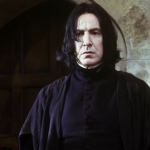Alan Rickman Talks Playing Snape

Jul 30, 2011
Rickman
In a new interview, Alan Rickman discusses the challenges and pleasures of playing Professor Severus Snape:
What has it been like playing an emotionally complex, ambiguous
character over these years? Has it been satisfying? Daunting? Both?
AR:
Well, it’s always rewarding to play people who are complicated because
that tests your acting machinery and places you right inside a great
piece of storytelling because great storytelling needs ambiguous
characters. It needs people where the audience and the readers don’t
quite know what they’re about. So, there’s a certain ‘who-done-it’
quality or ‘who-thunk-it’ or ‘who-done-what-to-him.’ And it helps you to
be very concentrated. I respond to what there is on the page and what
there was on the page was news to me every time we got to a new script.
Rickman also discusses filming at Leavesden Studios, and the legacy Harry Potter will leave:
Can you talk about shooting in Leavesden Studios? You think
of the amazing things that we see in these films, and Leavesden Studios
itself was one of the most unglamorous places but did have this magic
and this family inside of it that made amazing things happen. What was
it like working there?
AR: It depended what the weather was
like. It didn’t have the best heating system in the world, but I was
more fortunate than others with my costume, which was always pretty
warm. So, on a practical level, as you say, it had its failings. But it
certainly was home to us. I think what happened, really, was that over
10 years, we watched technology take up and run away with it so that at
the beginning we were sometimes at Leavesden or sometimes on incredibly
detailed sets on the back lot, or we were off on location somewhere.
And, as time went on and CGI got better and better, we went on location
less and less until the end almost not at all, because it could all be
done by magic, appropriately enough. Someone waved a computerized wand,
and Hogwarts and its world was just created around us.
What do you think of the legacy of these eight films, or the
film series’ place in the history of cinema? It has had a huge impact on
British cinema, British filmmaking, but in general, what do you think
the legacy will be?
AR:
Well, I hope ultimately its legacy
is to make people cherish the notion of telling a story and not trying
to do it by committee; that it is possible to trust a true storyteller’s
imagination and then serve it as honorably as possible, and that you
might just wind up with something that’s entertaining on the one hand,
makes a load of money on the other, and gives enormous silent and not so
silent pleasure to children and grownups. It’s just a validation of
something that we need. It’s a human need to be told stories, and I
don’t think it can be done by committee. I think it has to be one
person’s imagination. So, here’s to Jo Rowling and all who may sail in
her.
Rickman goes on to discuss working with the young cast, Ralph Fiennes (Voldemort), and J. K. Rowling’s input in the films. You can read the rest of the article here.





